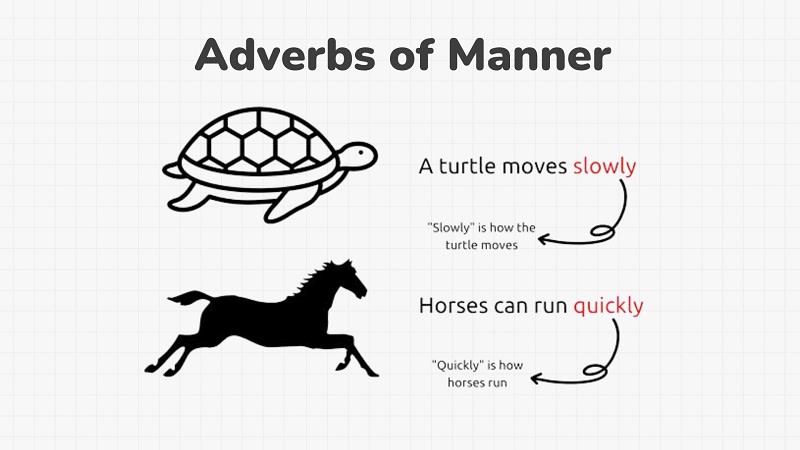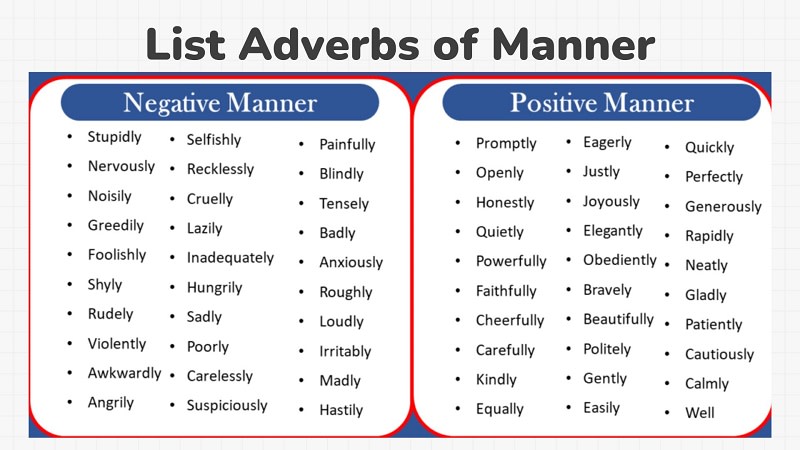Adverbs of Manner are a very important element that is widely used in writing and communication. They express the way an action is performed by the subject, making the sentence more creative and rich. This is a very important grammar topic for all students, especially those who are preparing for international exams or the upcoming IELTS exam.
So what are Adverbs of Manner? What are the positions and how to form Adverbs of Manner? Let's find out the details with IDP through this article.
1. What Are Adverbs of Manner?
Adverbs of manner are commonly used in both written and spoken English to describe how an action is performed. They add richness to a sentence by showing the method, tone, or state of the action done by the subject. These adverbs typically answer the question “How?”.
Examples:
The teacher spoke so quietly that the class couldn’t hear her.
More people compete creatively to develop alternatives.

2. How to Form Adverbs of Manner
Most adverbs of manner are formed by adding -ly to the end of an adjective: Adverb of manner = adjective + ly
Examples:
slow → slowly
quick → quickly
careful → carefully
However, there are several important spelling rules and exceptions to note:
Rule | Examples |
Adjectives ending in -y : change -y to -ily | happy → happily, easy → easily |
Adjectives ending in -le : change -le to -ly | simple → simply, reasonable → reasonably |
Adjectives ending in -ic : add -ally | basic → basically, fantastic → fantastically |
Adjectives ending in -ll : just add -y | full → fully, dull → dully |
For adjectives that already end in -ly, use the structure: in a + adjective + way
Examples:
friendly → in a friendly way
silly → in a silly way
Exceptions to Adverb Formation
Some adverbs have the same form as adjectives:
fast, hard, early, near, deep, right
Some adjectives ending in -ly are not adverbs and cannot form adverbs:
daily, weekly, friendly, lonely, lively
There are also adverbs with two different forms, each with different meanings:
Word | Form 1 | Form 2 | Example Sentences |
hard | works hard (with effort) | hardly (barely) | He works hard every day. / She hardly needed to study. |
late | arrive late (delayed) | lately (recently) | They arrived late. / Lately, job trends have changed. |
3. Position of Adverbs of Manner in Sentences
Adverbs of manner can appear in different positions depending on context and emphasis.
After the main verb or after the object
Structure: Subject + Verb + Adverb + (Object)
Examples:
He spoke three languages fluently.
She studied diligently at university.
Before the verb for emphasis
Structure: Subject + Adverb + Verb
Examples:
Nam quickly finishes his homework.
She hurriedly untied the ropes.
At the beginning of a sentence for stylistic effect
Structure: Adverb + Subject + Verb
Examples:
Patiently, Loi and Mark began to build another frame.
Confidently, he delivered his speech.
4. Common Adverbs of Manner in English

5. Practice Exercises – Adverbs of Manner
Exercise 1: Choose the correct form
Hoang is a careful driver. He drives my car very carefully.
Turtles walk slowly because they are slow animals.
A cautious person often speaks cautiously.
We are quiet; we are speaking quietly.
Minh Anh plays very well. He is a good player.
Trang Anh did a brilliant test. She passed the test brilliantly.
They had heavy snow yesterday. It snowed heavily.
Ha Anh looked at me angrily. Ha Anh has a very angry look.
Hoa slept comfortably in her comfortable bed.
Matt plays badly because he is a bad player.
Exercise 2: Rewrite sentences using adverbs of manner
He quickly finished his homework.
She carefully listened to his instructions.
She beautifully painted her room.
He works hard every day.
They happily played in the park.
Master Adverbs of Manner with Confidence – Study with IDP
Understanding how to use adverbs of manner correctly is essential for improving your fluency, especially in academic or test-preparation contexts such as the IELTS exam. Master their structure, position, and exceptions to maximize your score.
To support your learning journey, IDP offers:
Free IELTS mock tests
Weekly IELTS seminars
Personalized course recommendations
Practice materials tailored to your level and goals
Whether you choose to take the IELTS on computer or on paper, IDP organizes free trial tests every week, closely aligned with real test conditions and scored by Cambridge examiners.
Register for your IELTS test with IDP today!
